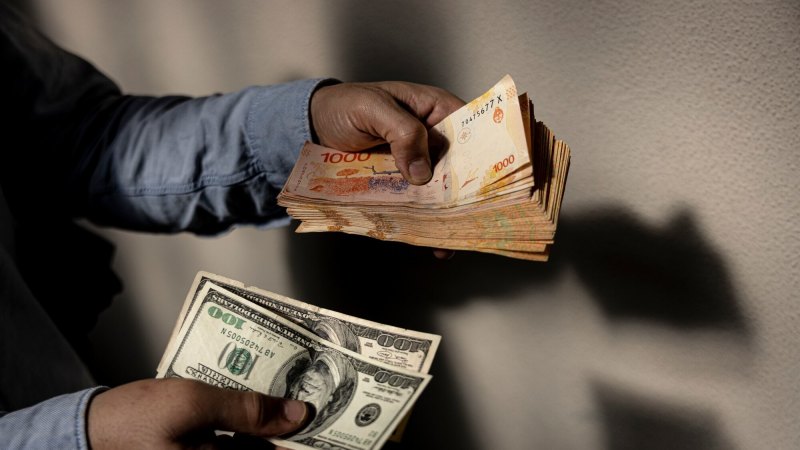Save articles for later
Add articles to your saved list and come back to them any time.
Visiting foreign football fans who mock Argentina’s crippling inflation crisis by burning banknotes will be punished with up to 30 days in prison.
Fans from neighbouring South American countries – primarily Brazil and Chile – have been burning and ripping up peso bills to taunt home teams about the value of the Argentinian currency.
A money changer holds US hundred-dollar banknotes and 1000-peso banknotes in Buenos Aires, Argentina.Credit: Bloomberg
Argentina’s inflation rate soared past 115 per cent last quarter, making it the world’s third highest, while the poverty rate stands at 42 per cent. More than half of all children live below the poverty line.
The country has also seen a dramatic fall in its exchange rate. In February, the central bank introduced a new 2000-peso note after the value of the 1000-peso note, previously the largest bill, fell to just $US2.70 ($4.15) on the alternative markets.
“This is a genuine social catastrophe for a country that used to be a predominantly middle-class society,” Dr Julio Montero, a researcher for National Research Council of Argentina, told the Telegraph.
Foreign fans caught tearing up a peso bill will now face up to 30 days in prison.
A video posted on Twitter on Wednesday night shows Corinthians fans, from Sao Paulo, burning bills and making offensive gestures.
Argentina’s Agency for the Prevention of Violence in Sport said the practice violates existing laws that prohibit “incitement to quarrel” at a sporting event and “provocations that will disturb public order”, local media reports.
Offending fans will be detained by local law enforcement and their clubs may also be punished if the problem persists, the body said.
Sergio Massa, Argentina’s economy minister and presidential candidate, speaks during a campaign rally in Buenos Aires on August 7.Credit: Bloomberg
The economic situation has also created turbulence in Argentina’s politics and has become the battleground for its looming elections, the primaries of which are held this coming Sunday. Last summer, three economy ministers succeeded one another in the space of four weeks.
Voting is obligatory by law, yet voter turnout is expected to be down amid anger and apathy.
“There is a lot of discontent, and it seems to me that many people are going to stay away, not even put a blank vote,” a 37-year-old teacher called Karina told Reuters.
The Telegraph, London
Get a note directly from our foreign correspondents on what’s making headlines around the world. Sign up for the weekly What in the World newsletter here.
Most Viewed in World
From our partners
Source: Read Full Article



